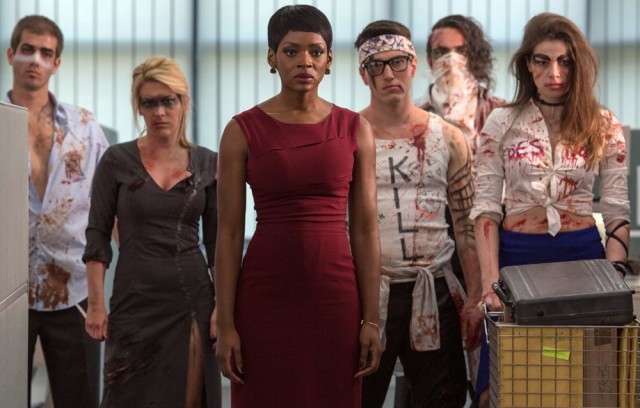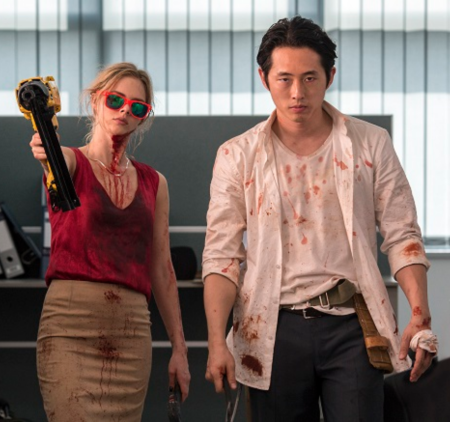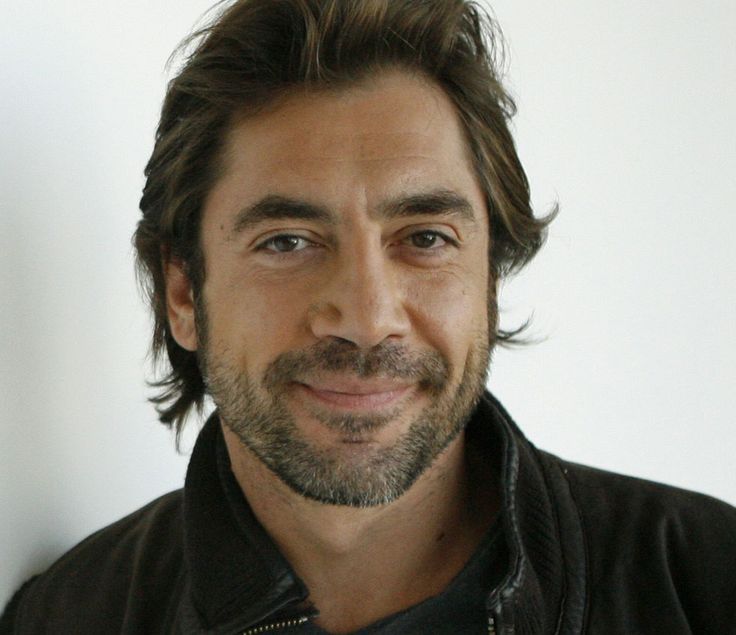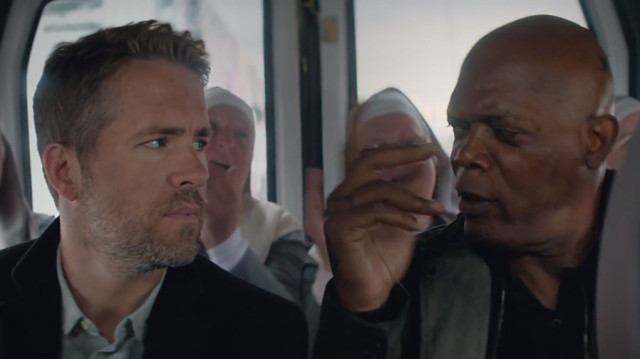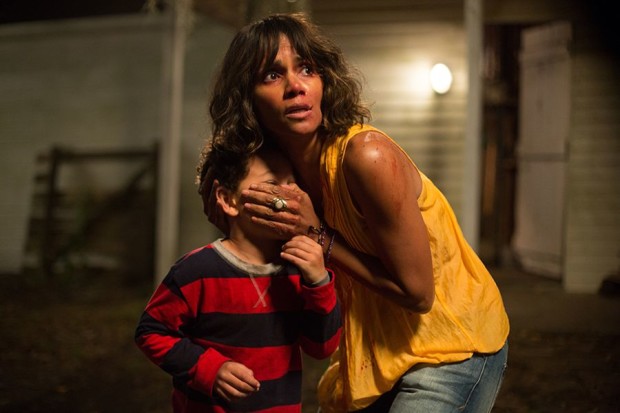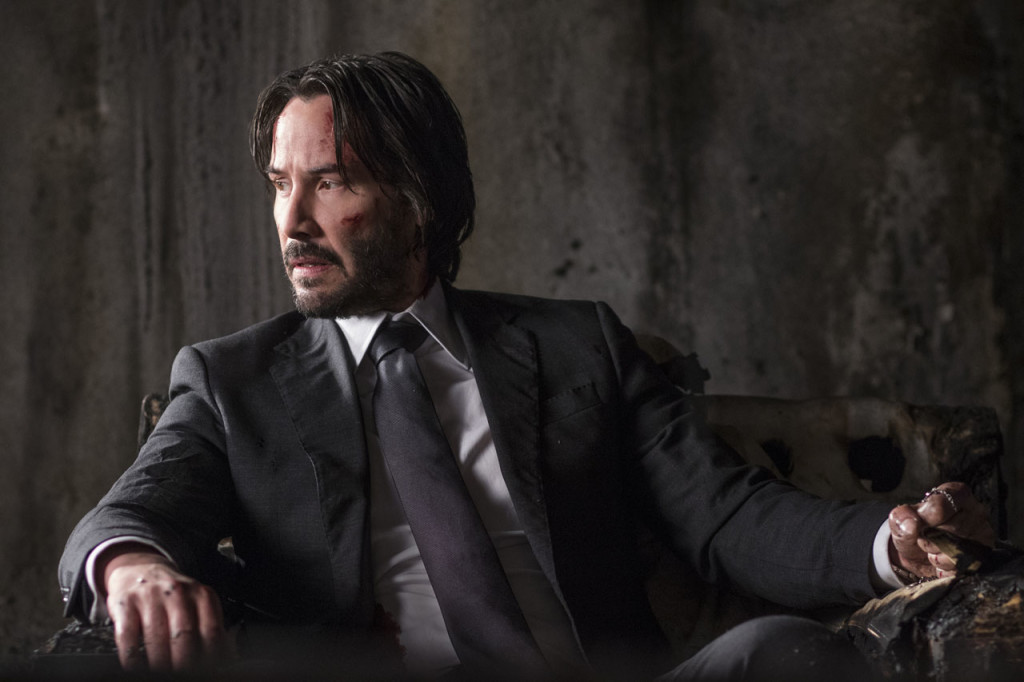Genre: True Story – Thriller/Comedy
Premise: (from Black List) The unbelievable true story of a family man from Alaska in the midst of a midlife crisis who embarks on what he hoped would be a dream sailing vacation but ends up shipwrecked in the Atlantic Ocean with a charming but psychotic sea captain who has decided to stop taking his medication
About: Today’s script finished in the Top 15 of last year’s Black List! The spec script was picked up by LD Entertainment, who most recently handled Oscar contender, “Jackie.”
Writer: Ben Bolea
Details: 110 pages
I’m running the name through my head over and over again: “Bolea…Bolea…Bolea.” Where have I heard that name? It sounded familiar. Finally, I plugged it into the Scriptshadow Search Machine and, lo and behold, look what came back. Bolea co-wrote the runner-up script in my first ever Scriptshadow Contest!
That script, about a group of Alaskan high school seniors facing their impending life after high school, was a big favorite of mine. I LOVE when this happens – seeing screenwriters who keep at it. It goes to show that when you’re dedicated and work hard and write your ass off, eventually, good things will happen. And it’s great to see that Ben’s still writing about Alaska! Write what you know, people!
“Burt Squire” starts off with a simple creed from Bolea:
I met Burt Squire at Floater’s Bar in Big Lake, Alaska. He heard what I do for work and said he had a story I would like. He was right. A week later I received a package containing a journal.
This screenplay is taken from those pages.
Burt was on his way to the adventure of a lifetime in 1996 – a dream trip to Sydney, Australia – when he found out his girlfriend, Mel, was pregnant. That trip had to be axed, and after having one beautiful son, Wyatt, and later another, Trevor, Burt eased into the family life.
17 years later, on the eve of his 40th birthday, Burt’s wondering how it all went by so fast. Instead of traveling the world going on adventures, the native Alaskan travels to schools and side roads, plowing snow every morning.
So when Burt’s boss offers him a chance to go on a sailing adventure with an old friend, Burt doesn’t have to think twice. The old friend, Vernon J. Knux, is on the other side of the country, in Rhode Island, and needs someone to help him sail his boat to the Caribbean. No experience needed! Which is important, since Burt doesn’t know Jack about sailing.
Knux acts exactly how his name sounds. He’s a weirdo to the nth degree, babbling on in every-sentence-contradicts-the-last homeless-person speak. But Burt chalks it up to the eccentric nature of a real live sea captain. And soon they’re sailing into the Atlantic, destination, Bermuda, where Knux is delivering the boat to his son.
Almost immediately, Burt realizes something ain’t kosher. Knux encourages pissing your pants over using the lavatory, has a penchant for Viking pornography, performs naked Yoga on the regular, only eats cream of mushroom soup, and sings Taylor Swift songs on his ukulele.
Burt can deal with Knux’s eccentricities. But he can’t deal with him disappearing into the cabin for days at a time while he, someone who’s never been on a boat in his life, is left in charge of sailing it. This plays out in predictable fashion, with Burt navigating the ship into a giant storm, which rips their sails, rendering them immobile.
As Burt turns to Knux for help, Knux spins into insanity, breaking the GPS so they can’t be located, before it’s revealed that this isn’t even Knux’s boat. He stole it from some rich guy. At a certain point, Burt realizes that surviving this inconceivable dilemma is all on him. To live, Burt will have to become the captain now.
A couple of things I want to mention off the bat.
Bolea does a good job setting up his main character, Burt. If possible, you want to introduce your protagonist in his everyday world. This not only allows us to get to know him in his natural environment, but it helps to create contrast with the extremes we’ll see him in later.
For example, if we hadn’t met Luke Skywalker fighting a life of boredom on Tatooine before blasting off on his adventure across the galaxy, we wouldn’t have appreciated the character as much. We needed to see him roll his eyes while drinking blue milk and change power converters to truly understand how crazy it was to be shooting at tie-fighters from the Millennium Falcon.
I’m a big believer in using CONTRAST whenever possible. If you’re going to show your character on a boat in the middle of the ocean during a beautiful summer, it’s a great idea to start as far away from that as possible. And what’s further away than plowing snow in Alaska?
I also noticed that “Burt Squire” was about escape. Which was the same theme Bolea explored in his Alaska high school script. Kids wanting to get out of this place and go do exciting things with their lives. I bring this up because wanting to break out of a mundane life is one of the most universal themes there is. People relate to that. And if they’re relating to that, they’re relating to your hero. Which means they feel like they’re a part of your story. That’s a powerful tool when you know how to harness it.
Where “Burt Squire” hits choppy waters is in its tone. The situation Burt’s been placed in is harrowing. He’s a non-sailor stuck in the middle of the ocean with a guy who’s so crazy he’s sabotaging their rescue.
However, Knux is so funny, so out there, you can’t stop laughing at him. That humorous component gave me a sense of security that everything would be okay. That was my dilemma. I never feared for Burt. And I think you have to fear for your main character in a script like this.
The good news is, actors are going to be jumping over each other to play this character. Knux is such a weirdo. I could see Jim Carrey playing the part. He’s crossed over into Crazyville anyway. This role wouldn’t be much of a stretch.
The project also benefits from the fact that there’s nothing else like it out there. As much as we talk about Hollywood remaking the same stuff over and over again, the truth is actors and directors ALWAYS want to do something different. So if you can get them to believe in your project, they have the power to push it through a resistant system.
“Burt Squire” was fun! I think it needs to decide if it wants to be more comedy or drama. But either way, it was an enjoyable read.
[ ] What the hell did I just read?
[ ] wasn’t for me
[x] worth the read
[ ] impressive
[ ] genius
What I learned: There’s something about putting characters on a boat in the middle of the ocean that I like. There’s nowhere to go. And if you can introduce some compelling conflict into that mix, you’ve got yourself a movie, because the characters have no choice but to hash things out. Remember, guys, movies are conflict. Find the most intense conflict-laden situation you can think of and the story will write itself.
I originally planned on reviewing Mayhem today. But then I watched it. And the movie is a borderline disaster. It’s one of the most overwritten over-directed movies I’ve ever seen in my life. I then rented the movie Columbus. That movie is like a delicate slice of cinematic sweetbread. It’s also one of the most underwritten under-directed movies I’ve seen in my life. So I thought it’d be fun to review these two contrasting pieces of entertainment together.
And here’s the funny part.
I’d tell each and every one of you to write the abysmal Mayhem over the brilliant Columbus.
For those who don’t know, Mayhem is about a company attacked by a virus that makes its victims succumb to their worst impulses. If you’re an angry person, it makes you extremely violent. If you’re slightly manipulative, you become a sociopath. If you’ve got sex on the brain, it turns you into a walking sex machine.
When their building is placed on an 8 hour quarantine, a recently fired employee, Derek, enacts revenge on everyone who screwed him over, teaming up with a former female client the company also screwed over, to do so.
I expected to LOVE this movie. I thought the premise was fun. It was a way to make a zombie film without making a zombie film. It had that “familiar but different” thing Hollywood’s so keen on.
But the execution was too over-the-top, as subtle as your loud inappropriate drunk uncle. On the screenplay side, half the script is dedicated to explaining the virus. Even though the opening montage is specifically built to explain every nuance of the virus, we’re still being given virus rules 40 minutes later.
Here’s something to keep in mind for new screenwriters. Exposition (the process of explaining things so that your story makes sense) is fought on two fronts. The front everyone focuses on is the “How to Limit My Exposition” front. You’re trying to minimize how much you explain everything. Which is good. You should be doing this.
But the other front, the one nobody talks about, is to simplify your plot and rules in the first place! If you build your story on top of a simple premise and simple rules, you won’t need to explain as much! By making this virus, this company, the people within this company, and the laws governing this virus, so complicated, they had no choice but to use up half the movie on exposition.
On the other end of the spectrum was Columbus.
Columbus takes place in the titular town of Columbus, Indiana, a hidden goldmine for some of the most beautiful architecture in the country. When a visiting professor of architecture falls gravely ill, his son, Jin, must fly in and wait for the doctors to figure out what to do with him. In the meantime, he meets a townie, Casey, with the potential to do something great in the world, but who’s sacrificed that opportunity to take care of her addict mother.
Talk about completely opposing plots, right? Whereas every second of Mayhem is dedicated to explaining something or killing someone, you might go 3-4 minutes at a time in Columbus without a character saying a word.
The movie is one of the most beautifully shot I’ve ever seen, so much so I tracked down interviews with the elusive director, a 50-something Korean man named Kogonada (who up until this point had only done video essays and never been on an actual movie set). Listening to him discuss his film was fascinating. His entire approach to filmmaking is to prioritize form over plot. To him, the perfect shot (of a building, a character, a lone room in a house) was far more important than two characters conversing. It’s pretty much the antithesis of what I preach. And yet it worked brilliantly for the film.
What Is Neorealism? from kogonada on Vimeo.
Granted, Kogonada has a filmmaking eye like no other. Every frame of his is a painting. Therefore, had a less talented director tried to do the same thing, I’m sure I’d have been chastising him for not focusing more on story.
With that said, Kogonada still finds a story that resonates. Remember, you can get away with simple plots as long as the themes are universal, as long as the issues are relatable. Both Jin – working a soulless corporate job that’s desensitized him to the world – and Casey – being stuck in a small town instead of going out and following her dreams – are universal conflicts that many people can identify with.
And unlike Mayhem, where the plot had to be jammed in our faces every five seconds, Kogonada used the most minimal plot device possible – a sick father who was keeping our main character stuck in town. It was a big reason why the story worked so well. The plot point that placed our characters together was borderline invisible.
With all that said, if you’re choosing between writing a Mayhem or a Columbus? I’ll tell you to write Mayhem every time. It’s got a fun hook. It’s marketable. You can imagine the movie when someone pitches it to you. It’s going to get priority over a “Columbus” like idea in every production room in town.
Not to mention, the prestige Straight-To-Digital release is an emerging avenue for spec screenwriters. I say “prestige” so it’s separated from the abysmal D-Movie efforts that Nic Cage and John Cusack star in. These prestige digital offerings are cooler, hipper, the kind of stuff that’s going to get play on movie web sites. But that means your idea needs to be cool and hip. It cannot, sadly, be Columbus.
With that said, Columbus is the perfect vehicle for a writer-director. If you have something that isn’t sexy on the page but you KNOW is going to look great on film, directing the movie yourself is the way to go. Realistically, nobody’s going to be interested in your small personal movie but you. And that’s okay. Cause plenty of these personal writing-directing efforts turn out to be great.
But if you have no interest in directing? Come on. Be smart. Write something with a hook like Mayhem.
That’s right. No Amateur Offerings this weekend.
I’m playing with this idea of doing it every other weekend, making it more of an event. But that could change at any moment. Also, for those interested in contributing to Monday’s review, I’m watching “Mayhem.” The well-reviewed film is out in theaters and on Digital. So you can rent it right now. I think Mayhem represents a new tasty avenue for spec screenwriters.
Meanwhile, they’re making a NEW Star Wars Trilogy with Rian Johnson. As in, NO SKYWALKERS.
Disney must loooooooove The Last Jedi. Either that or this is the reward for being the only Star Wars director that Kathleen Kennedy actually liked. I have to admit, I’m skeptical. The biggest achievement of Star Wars was its world-building. It created an entire galaxy of planets and ships and aliens and cool characters. To try and do that all over again from scratch is a huge undertaking.
When I watch The Last Jedi trailer, I don’t see any world-building at all. It’s all stuff we’ve seen before. I’m hoping Disney got brave and they’re hiding all the new stuff for the film. That’s the only thing that makes sense to me. Whatever the case, this upped my interest in The Last Jedi ten-fold. An entire new trilogy is resting on it. Talk about stakes. Rian Johnson said it best on his Twitter. “Obviously I hope you like The Last Jedi. But man now I REALLY hope you like The Last Jedi.”
Genre: Thriller/Drama
Premise: A Vietnam POW struggles to survive captivity to seek revenge on the group of soldiers who betrayed him and left him for dead.
Why You Should Read: Been at this incredibly rewarding and gut-punching craft for seven years now. I’ve had my share of contest placements and even turned one of my ten scripts into a multi award-winning book, however, I’m still on the hunt for that big breakthrough. For this script I stepped way out of my comfort zone and broke some of the so-called “rules.” This is a past/present script that is part The Revenant, part Apocalypse Now, and part Saw. Would love the invaluable feedback from the Scriptshadow community to make it the best it can be.
Writer: John Avrai
Details: 95 pages
We had a tie in last weekend’s Amateur Offerings.
And that meant the onus was on ME to pick a winner. This is a good time to take you into the mind of a script-reading madman, because I think the way I approach which script to read is similar to how most people in the industry would choose between two scripts, all else being equal.
The primary determining factor is, which concept do I like better? In this case, I felt both concepts sounded interesting. And that led me to determining factor number 2. You guys are going to hate me for this but I promise you it’s something most producers and agents use in their decision-making process as well. That’s right. Page count. One script was 105 pages. The other was 96. The latter would save me 7-10 minutes of time in my evening. Game, set, match. My Sojourn in Hell.
That’s not to say Dark Horde will never get the call. It could come up in a Rematch Week somewhere down the line. But right now. It’s all about the sojourn, baby. Even if I don’t yet know what sojourn means.
Might need to change that title.
Okay.
Plot summary.
69 year-old Eiten Comacho has just flown into town for a Veterans Benefit. Camacho, a badass soldier in the Vietnam War, isn’t off the plane more than five minutes when he’s approached by a woman who claims to be associated with the proceedings. She guides him towards a parking lot where he’s quickly drugged and thrown in the back of a van.
When he wakes up, he’s with three members of his old infantry unit back in Vietnam. There’s Whybrow, a chickenshit wannabe weatherman, Ox, a former tough guy who’s since found the lord, and Emmit, Ox’s dumbass little brother. All the men have been cuffed and restrained.
They’re soon met with the sight of the woman who drugged and kidnapped them.
Before we can work out what’s happening, we flash back to Nam, where we meet Fort, the weakest member of their outfit – a man so incompetent (he can’t even do one pushup) that the others are routinely forced to pick up his slack. It gets so bad that Comacho beats the hell out of Fort in the hopes that he gets stuck in medical and they never have to see him again.
From there, we cut back and forth between the past and the present, learning more about how the guys bully Fort, and more about this mysterious woman who’s torturing them. Eventually we find out that Camacho killed a local Vietcong woman, and to make sure the word never gets out, he attempts to kill Fort as well. But Fort survives and is later captured by the Vietcong.
Back in the present, the mysterious woman drops a bombshell on all of them. Their shitty lives since Nam (they’ve all been victims of a string of bad luck) have been meticulously orchestrated by her. She made sure Camacho went to prison for 30 years. She made Ox’s business fail. She sabotaged Whybrow’s weatherman job. She’s the sole source of their miserable lives.
Who is this woman? Why is she such a monster? Will she kneel for the anthem on Sunday? And what ever did happen to poor Fort, who barely escaped Camacho’s murder attempt that day? Inquiring minds should check the comments section for answers.
On Wednesday, I complained about a script that was too predictable.
So before I do anything, I have to give props to John for writing a script that, for 60 pages, I had NO IDEA where it was going. When he says he broke rules, he wasn’t lying. This was a wild one.
For starters, there’s no protagonist! Going the no-protagonist route is extremely risky because audiences want somebody to latch on to. They want to feel connected to someone. We didn’t feel connected to anybody here. I mean, Camacho was introduced first so I thought he was our hero. Yet he’s the most despicable character of the bunch. After I found that out, I was left stranded. Who am I rooting for now? Crazy Torture Lady? Kind of hard to get on board with mysterious torturers. Was Fort our hero? No. For the first 60 pages, we only see him through the eyes of others. Talk about keeping me on my toes!
Despite its unpredictable nature, the script still had an ENGINE. What I mean by an ENGINE is that there was still something DRIVING our interest, our need to keep turning the pages. It’s important I make this distinction because it’s easy to write something unpredictable if you just ramble on aimlessly. But we’re going to lose interest if it’s clear the story isn’t going anywhere. Here, the script still had this mystery of: Who is this woman and why is she doing this? So despite us jumping all over the place and going back to Nam for these crazy flashbacks, I was still driven by the desire to find out what this woman’s end game was.
Another thing I picked on the other day was the writer not doing anything unexpected with the plot. You have to take chances with your plot beats or else the story becomes boring. Here, midway through the script, the crazy woman simply unlocks everybody and gives them access to a machine gun! Our characters could’ve hopped up and killed this psycho right then. It was moments like this where I said, “Wow, I did not expect that!”
So what’s the deal then? Did I like this script?
Here’s the problem with My Sojourn In Hell despite its mysterious setup and consistent risk-taking: It was seeped in anger. Reading the script made me feel sad, depressed, angry. Watching the worst in human beings exploit the worst in other human beings – That’s not my cup of tea. And I get that this isn’t an issue for some readers, which I respect. But, for me, a script has to have a sense of hope SOMEWHERE. I can’t leave feeling like humanity is hopeless. It’s just too depressing.
Even in the torture-porn era, you had the torturer, and you had the person getting tortured. And the person getting tortured was usually good. So you were hoping they were going to somehow get out of this and maybe kill the villain. Remind us that good conquers all. My Sojourn In Hell gave us bad people going after bad people. And so even if I was intrigued by what was going to happen next, I never had someone to root for.
In addition, the final act falls apart. The stuff about one brother secretly fathering the other brother’s son felt kooky. And to add this entirely new character of Lee (who accompanies Fort in a POW camp) with 30 pages to go… it felt like the narrative was unraveling rather than coming together. In a way, Fort becomes our hero. But like I said above, we barely knew the guy. We only saw him through the eyes of others, and usually simplistically. He wouldn’t do a push-up right and people would kick his ass. That’s not how you get an audience to root for a character. We have to get to know him on some level.
Also, I figured out what the twist was with a good 40 pages to go, only because there was literally NO other way it could’ve gone.
With that said, John is a good writer. I’d encourage him to enter Amateur Offerings again with something that’s less of a downer. But that’s just my opinion. What did you guys think?
Script link: My Sojourn In Hell
[ ] What the hell did I just read?
[x] wasn’t for me
[ ] worth the read
[ ] impressive
[ ] genius
What I learned: If you’re a writer who wants to take some big chances with your narrative, really be unpredictable, this is a good way to do it. Have a giant unanswered question/mystery at the center of your story, and the reader will let you bounce around and do a lot more avant-guarde stuff than usual.
The Spec Market has been on life support for awhile now. Some of this is due to things beyond our control – IP Superhero movies taking over the bulk of high-budget studio output (gone are the days of original titles like Men in Black). But an equal amount of blame should be placed on our shoulders. We haven’t been writing good screenplays. I mean, here are the top 10 non writer-director non-true-story spec scripts turned movies of 2017.
Girls Trip $115 mil – 89% RT
The Hitman’s Bodyguard $75 mil – 39% RT
Happy Death Day $53 mil – 70% RT
47 Meters Down $44 mil – 54% RT
Fist Fight $32 mil – 26% RT
Kidnap $30 mil – 36% RT
Life $30 mil – 67% RT
The House $24 mil – 16% RT
Wish Upon $14 mil – 17% RT
The Founder – $12 mil – 83% RT
When your fifth biggest spec-turned-film of the year is FIST FIGHT??? The system’s, shall we say, down for the count. I mean, imagine having to watch all of these movies in a row. It’s the fast food equivalent of eating luke warm chicken McNuggets, a stale shell taco from taco bell, mealy orange chicken from Panda Express, a six inch dry turkey sub no mayo from Subway, a day old chocolate donut from Dunkin Donuts, just the sauce from KFC’s latest tangy chicken coating offering, a Jr. Whopper, anything off the Long John Silver menu, a Domino’s Pizza hot wing, and a chili cheese dog from Wienerschnitzel, all in a row.
Man that analogy was WAY too specific. But you get the point.
Why have spec scripts gotten so bad? Well, remember that the big dogs, the David Goyers and David Koepp’s of the world, are pulling in 7 figures for assignment work, which means they’re not bothering with spec scripts. This leaves the bulk of the spec playing ground to newbies and low-rung screenwriters, those whose understanding of the craft is still in the early stages. Hence, they’re not as likely to write something great.
Another problem is that the better low-rung writers like to write in prestige genres (read: unmarketable) like drama, period, and true story. That leaves even fewer good writers who like fun popcorn genre material. I mean, let’s be honest. A movie like Kidnap gets made because it’s fast-paced, has an easy-to-understand high stakes premise, and can garner a name actor you can throw on a poster. That’s how all those Liam Neeson thrillers got made as well. But how many writers out there actually want to write Kidnap or The Commuter? Not many. So the pool of writers writing these cheap but marketable premises is few. And the quality of the output is a reflection of that.
The formula for jump-starting the spec market will come in one of two forms. Form 1 is a hot new writer with a super-unique voice: A Quentin Tarantino, a Diablo Cody, a Charlie Kaufman. What writers like this do is they get people excited about spec scripts again. And that has a residual effect on the market. It also inspires other writers to write in a similar fashion, and you have agents and producers trawling through the copycat material to take advantage of this new avenue of getting movies made.
The closest we’ve had to this lately is Max Landis. But Landis’s voice is reflected more in his social media output than his screenplays. We haven’t had a true unique voice game-changing screenwriter in awhile now so we’re due for one. I hope he’s one of you guys. Cause the sooner that writers starts making waves, the sooner the spec world heats up again.
Form 2 is we need two non writer-director spec scripts to be surprise successes at the box office within a few months of each other. It has to be two. If it only happens once, Hollywood will call it a fluke. But twice is the beginning of a trend. This almost happened with the success of spec script, John Wick. But there was no follow-up to make it a trend. Also, John Wick is a weird example, since the first film did reasonably well, but not bonkers well. It was more what they did with the second movie that elevated the franchise, and by then the buzz of John Wick as a spec was long gone.
With the way the industry is being run now, here’s where I’d say you should focus to become the writer of one of these surprise hits. REAL WORLD ACTION. GuyOrGirl-with-a-gun movies (John Wick, Jason Bourne), GuyOrGirl-in-a-car movies (Fast and Furious), Government agency-movies (new takes on James Bond). Or, SOME REAL WORLD VARIATION of these that isn’t out there yet. And that’s probably going to be the most likely avenue for success, since it will be new and fresh.
Here’s why those worlds specifically. Right now, Hollywood’s got its big-budget fantasy and science-fiction slots taken care of. They’ve got superheroes and Star Wars. Those are the most expensive movies to make. So they’re only going to spend all that money if they’ve got intellectual property awareness that’s through the roof. They’re not going to spend it on your unknown 300 million dollar sci-fi movie idea, “Space Wagons in the Milky Way.”
Real world stuff is cheaper to make and due to the way action travels, it’s not as important that the material be based on IP. But guys, there’s a rub to this. I’d go so far as to say a danger in it. Action movies are almost, by definition, generic. Tough guys saying tough things while either shooting a gun or driving a car isn’t interesting. If you’re going to write a great spec script in this arena, it will need to excel in some area. The characters will have to be deeper and more interesting than we’re used to. The set pieces will have to be stuff we’ve never seen before. The concept will need to be clever in some fresh way. The narrative will need to take us in directions we weren’t expecting.
Some of you might be wondering why I’m not mentioning horror. Get Out. Split. Keep in mind that both of those were writer-director specs. So they’re not as applicable. However, you’re right in pointing out that those types of scripts DO sell. The issue is more in how the industry sees these specs. Horror will always be seen as small potatoes. So the amount of money even the biggest horror specs garner will never be enough to jump start the spec market. For that, we need big money sales, and those are more likely to come from higher budgeted films.
The last sleeper arena I’d say could jump start the spec market is a really clever sci-fi premise that doesn’t cost too much (but also doesn’t cost too little). Remember, The Martix was shot for just 60 million dollars. Why? Because their premise cleverly allowed them to shoot 90% of the “science fiction” in real-world locations. If you can come up with a premise like that? Which promises something cool at a reasonable budget, that’s worth exploring. Ditto if it’s fantasy (this is basically what they did with Bright).
Keep in mind that the advice I’m giving here is SPECIFICALLY geared towards selling specs that could then get turned into big movies which would then jump start the spec market. There are other ways to succeed as a screenwriter. For example, if you care more about writing one of Disney’s Star Wars movies than you do selling a script, maybe writing “Space Wagons in the Milky Way” (with a better title, of course) is the route to go. If the script gains some traction and gets in the hands of Disney folks, there’s no reason to think you couldn’t get a meeting with the Mouse House.
Ditto if you want to be thought of for the next Wolf of Wall Street job. Write a big fun Scorsese type movie about flashy subject matter and flashier characters that takes place in one of the previous six decades. Show them that’s your wheelhouse and if the script is good, you’ll get meetings for that kind of stuff.
But if we’re going to jump start the spec market, it’s going to happen in one of the two ways I listed above. It’s up to you whether you want to follow that advice or carve your own parth. Whatever the case, I’m rooting for you. :)


